Associate of Science...Degree Program Development
Program Manager's Note:
To incite students to pursue advanced degrees in the life sciences, the KuC Science and Technology Academy is assisting in the development of a two year certificate and degree program for students in the YK Delta. It supports the Academy's effort to 'bring students into the fold' by providing an interim/obtainable degree leading to advanced study. This program integrates traditional ways of knowing directly into our curriculum. [Both goals of the NSF TCUP effort at our campus.] This program development is supported in part through a grant from the USDA.
Associate of Science Degree Program
Emphasis: Ethnobotany
Ethnobotany is the study of how people of a particular culture and region make of use of indigenous plants. Ethnobotanists explore how plants are used for food, shelter, medicine, clothing, hunting, and religious ceremonies.
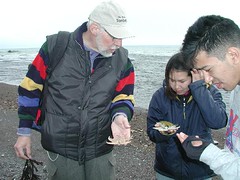
The Y-K Delta region of Alaska (our KuC service region) represents one of the most traditional societies in Alaska and in the United States. Our communities are primarily subsistence-based both in spirit and economy. People of our region are still considered traditionalists and represent a ‘community’ of hunters and gatherers. Indigenous plants play a major role in the everyday lives of all of our people. While the western term ‘ETHNOBOTANY’ may not be recognized by many of these traditionalists, the importance of indigenous plants and the crucial role that the flora of our region plays in food, medicine and community well-being are recognized by all.
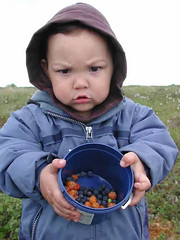
Our program is designed to meet four major goals:
1. Integrate ‘indigenous knowledge systems’ and ‘traditional science’ into the core life science curriculum at our Kuskokwim Campus.
2. Provide young students with attractive, culturally relevant curriculum and an ‘intermediate step’ as they enter an academic pathway in the sciences.
3. Provide culturally relevant research opportunities for KuC students and faculty in the life sciences. Partnerships developed will include: UAF’s Institute for Arctic Biology, US Fish and Wildlife Service, Alaska State Fish and Game, NIMA Corporation, University of Hawai’i, the Pacific Alliance, Alaska Native Science and Engineering Program, et al.
4. Model efforts supporting the development of regional economic ethnobotany initiatives and knowledge-based economies in the Y-K Delta region.
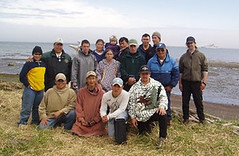
Our Associate of Science degree program, with an emphasis in Ethnobotany, is designed to meet these objectives. The program builds on a substantial base of knowledge already in place in our region and our college campus. It integrates well with our plans for an Associate of Science degree program and draws upon a large local base of traditional knowledge. Adjunct instructors are locally recognized traditional ethnobotanists and traditional healers, both of whom have committed their careers to this science. Our core National Science Foundation faculty and staff will provide core support for all science and math curricula associated with this program.
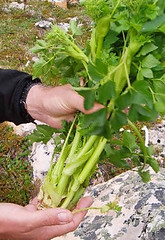
Ethnobotany courses core to the Associate of Science degree include:
Floral Ecology of the Yukon- Kuskokwim Delta – will explore how the ecological roles and characteristics of local plants relate to the principles of both modern ecology and indigenous culture.
Ethnobotanical Chemistry – will examine the chemical characteristics of the local flora, including study areas such as medicinal and pharmacological properties, fragrance characteristics, pollutant and contaminant concentration and processing, nutritional and dietary properties, etc.
Economic Ethnobotany – will explore the current and potential economic and cultural importance and usages of indigenous plants.
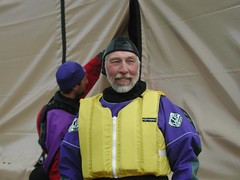
Program development lead is Dr. Clifton (Corky) Corkern
Dr. Corkern holds degrees in biology from Southeastern Louisiana College and Texas A&M University. He currently teaches Biology (including Natural History of Alaska) at KuC. His academic, field, and shipboard background includes work with fungi, algae and phytoplankton, and vascular plants.
To incite students to pursue advanced degrees in the life sciences, the KuC Science and Technology Academy is assisting in the development of a two year certificate and degree program for students in the YK Delta. It supports the Academy's effort to 'bring students into the fold' by providing an interim/obtainable degree leading to advanced study. This program integrates traditional ways of knowing directly into our curriculum. [Both goals of the NSF TCUP effort at our campus.] This program development is supported in part through a grant from the USDA.
Associate of Science Degree Program
Emphasis: Ethnobotany
Ethnobotany is the study of how people of a particular culture and region make of use of indigenous plants. Ethnobotanists explore how plants are used for food, shelter, medicine, clothing, hunting, and religious ceremonies.

The Y-K Delta region of Alaska (our KuC service region) represents one of the most traditional societies in Alaska and in the United States. Our communities are primarily subsistence-based both in spirit and economy. People of our region are still considered traditionalists and represent a ‘community’ of hunters and gatherers. Indigenous plants play a major role in the everyday lives of all of our people. While the western term ‘ETHNOBOTANY’ may not be recognized by many of these traditionalists, the importance of indigenous plants and the crucial role that the flora of our region plays in food, medicine and community well-being are recognized by all.

Our program is designed to meet four major goals:
1. Integrate ‘indigenous knowledge systems’ and ‘traditional science’ into the core life science curriculum at our Kuskokwim Campus.
2. Provide young students with attractive, culturally relevant curriculum and an ‘intermediate step’ as they enter an academic pathway in the sciences.
3. Provide culturally relevant research opportunities for KuC students and faculty in the life sciences. Partnerships developed will include: UAF’s Institute for Arctic Biology, US Fish and Wildlife Service, Alaska State Fish and Game, NIMA Corporation, University of Hawai’i, the Pacific Alliance, Alaska Native Science and Engineering Program, et al.
4. Model efforts supporting the development of regional economic ethnobotany initiatives and knowledge-based economies in the Y-K Delta region.

Our Associate of Science degree program, with an emphasis in Ethnobotany, is designed to meet these objectives. The program builds on a substantial base of knowledge already in place in our region and our college campus. It integrates well with our plans for an Associate of Science degree program and draws upon a large local base of traditional knowledge. Adjunct instructors are locally recognized traditional ethnobotanists and traditional healers, both of whom have committed their careers to this science. Our core National Science Foundation faculty and staff will provide core support for all science and math curricula associated with this program.

Ethnobotany courses core to the Associate of Science degree include:
Floral Ecology of the Yukon- Kuskokwim Delta – will explore how the ecological roles and characteristics of local plants relate to the principles of both modern ecology and indigenous culture.
Ethnobotanical Chemistry – will examine the chemical characteristics of the local flora, including study areas such as medicinal and pharmacological properties, fragrance characteristics, pollutant and contaminant concentration and processing, nutritional and dietary properties, etc.
Economic Ethnobotany – will explore the current and potential economic and cultural importance and usages of indigenous plants.

Program development lead is Dr. Clifton (Corky) Corkern
Dr. Corkern holds degrees in biology from Southeastern Louisiana College and Texas A&M University. He currently teaches Biology (including Natural History of Alaska) at KuC. His academic, field, and shipboard background includes work with fungi, algae and phytoplankton, and vascular plants.

<< Home